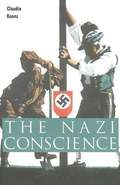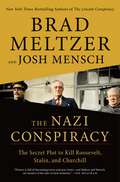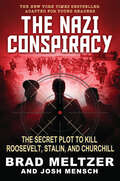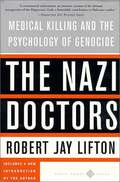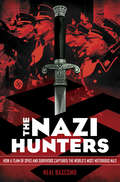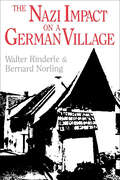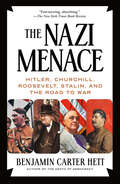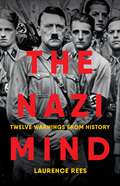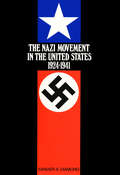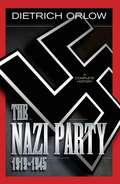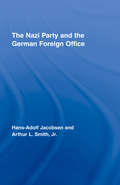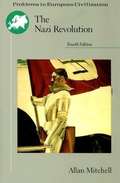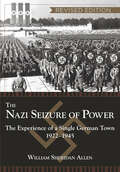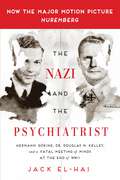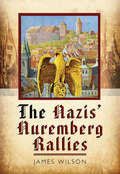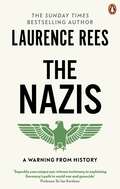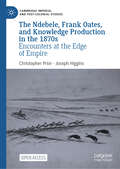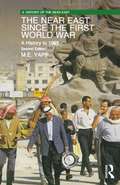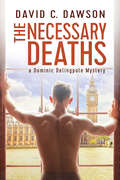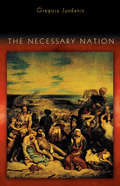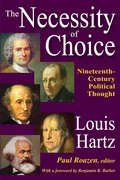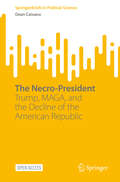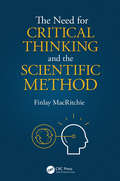- Table View
- List View
The Nazi Conscience
by Claudia KoonzOrdinary Germans were prepared for wartime atrocities by racial concepts widely disseminated in media not perceived as political: academic research, documentary films, mass-market magazines, racial hygiene and art exhibits, slide lectures, textbooks, and humor.
The Nazi Conspiracy: The Secret Plot to Kill Roosevelt, Stalin, and Churchill
by Brad Meltzer Josh MenschINSTANT NEW YORK TIMES BESTSELLER"An absolute home run! You will never look at WWII the same way again." —Brad Thor, #1 bestselling author"Meltzer and Mensch are masters." —Jon Meacham, author The Soul of America"A true story that reads like a thriller." —Alexander S. Vindman, LT. Col., U.S. Army (Ret.)"An outstanding and memorable reading experience....a true page-turner from beginning to end." —Bookreporter.comFrom the New York Times bestselling authors of The First Conspiracy and The Lincoln Conspiracy comes the little-known true story of a Nazi plot to kill FDR, Joseph Stalin, and Winston Churchill at the height of World War II.In 1943, as the war against Nazi Germany raged abroad, President Franklin Roosevelt had a critical goal: a face-to-face sit-down with his allies Joseph Stalin and Winston Churchill. This first-ever meeting of the Big Three in Tehran, Iran, would decide some of the most crucial strategic details of the war. Yet when the Nazis found out about the meeting, their own secret plan took shape—an assassination plot that would’ve changed history.A true story filled with daring rescues, body doubles, and political intrigue, The Nazi Conspiracy details FDR’s pivotal meeting in Tehran and the deadly Nazi plot against the heads of state of the three major Allied powers who attended it.With all the hallmarks of a Brad Meltzer and Josh Mensch page-turner, The Nazi Conspiracy explores the great political minds of the twentieth century, investigating the pivotal years of the war in gripping detail. This meeting of the Big Three changed the course of World War II. Here’s the inside story of how it almost led to a world-shattering disaster.
The Nazi Conspiracy: The Secret Plot to Kill Roosevelt, Stalin, and Churchill (Young Reader's Edition)
by Brad Meltzer Josh MenschNew York Times bestselling authors Brad Meltzer and Josh Mensch adapt their instant bestseller, The Nazi Conspiracy, for young readers to bring them the heart-pounding story of the assassination plot that nearly changed the course of history.It's 1943. Nazi Germany and its Axis power allies are ravaging Europe and the Pacific with a terrible war. At this juncture, President Franklin Roosevelt has one critical goal: a face-to-face meeting with his allies, Joseph Stalin and Winston Churchill.The first ever meeting of the "Big Three" is set to take place in Tehran, Iran, where the leaders of the three great superpowers will discuss and decide on some of the most crucial strategic details of the war.But when the Nazis learn about the meeting, they form their own secret, deadly plan: an assassination plot that would forever change history...if they're successful.This riveting true story, filled with daring rescues and high stakes intrigue, explains how this pivotal meeting in Tehran changed the course of World War II, and how the Nazi conspiracy to assassinate the Allied leaders nearly led to world-shattering disaster.Renowned authors Brad Meltzer and Josh Mensch bring their New York Times bestseller, The Nazi Conspiracy, to young readers for the first time with this action-packed page-turner that offers an informative overview of World War II and details the heart-pounding true story of the Nazi plot to assassinate Roosevelt, Stalin, and Churchill at the height of World War II.Scholastic Focus is the premier home of thoroughly researched, beautifully written, and thoughtfully designed works of narrative nonfiction aimed at middle-grade and young adult readers. These books help readers learn about the world in which they live and develop their critical thinking skills, so that they may become dynamic citizens who are able to analyze and understand our past, participate in essential discussions about our present, and work to grow and build our future.
The Nazi Doctors: Medical Killing and the Psychology of Genocide
by Robert LiftonIn his most powerful and important book, renowned psychiatrist Robert Jay Lifton presents a brilliant analysis of the crucial role that German doctors played in the Nazi genocide. Now updated with a new preface, The Nazi Doctors remains the definitive work on the Nazi medical atrocities, a chilling exposé of the banality of evil at its epitome, and a sobering reminder of the darkest side of human nature.
The Nazi Hunters: How A Team Of Spies And Survivors Captured The World's Most Notorious Nazi
by Neal BascombA thrilling spy mission, a moving Holocaust story, and a first-class work of narrative nonfiction.This Sydney Taylor Book Award- and YALSA Excellence in Nonfiction Award-winning story of Eichmann's capture is now a major motion picture starring Oscar Isaac and Ben Kingsley, Operation Finale!In 1945, at the end of World War II, Adolf Eichmann, the head of operations for the Nazis' Final Solution, walked into the mountains of Germany and vanished from view. Sixteen years later, an elite team of spies captured him at a bus stop in Argentina and smuggled him to Israel, resulting in one of the century's most important trials -- one that cemented the Holocaust in the public imagination.This is the thrilling and fascinating story of what happened between these two events. Illustrated with powerful photos throughout, impeccably researched, and told with powerful precision, THE NAZI HUNTERS is a can't-miss work of narrative nonfiction for middle-grade and YA readers.
The Nazi Impact on a German Village
by Bernard Norling Walter Rinderle“A vivid & sensitive portrait of a small, tradition-bound community coming to terms with modernity under the most adverse of conditions.” —Observer ReviewMany scholars have tried to assess Adolf Hitler’s influence on the German people, usually focusing on university towns and industrial communities, most of them predominately Protestant or religiously mixed. This work by Walter Rinderle and Bernard Norling, however, deals with the impact of the Nazis on Oberschopfheim, a small, rural, overwhelmingly Catholic village in Baden-Wuerttemberg in southwestern Germany.This incisively written book raises fundamental questions about the nature of the Third Reich. The authors portray the Nazi regime as considerably less “totalitarian” than is commonly assumed, hardly an exemplar of the efficiency for which Germany is known, and neither revered nor condemned by most of its inhabitants. The authors suggest that Oberschopfheim merely accepted Nazi rule with the same resignation with which so many ordinary people have regarded their governments throughout history.Based on village and county records and on the direct testimony of Oberschopfheimers, this book will interest anyone concerned with contemporary Germany as a growing economic power and will appeal to the descendants of German immigrants to the United States because of its depiction of several generations of life in a German village.“An excellent study. Describes in rich detail the political, economic, and social structures of a village in southwestern Germany from the turn of the century to the present.” —Publishers Weekly“A lively, informative treatise that puts a human face on history.” —South Bend Tribune“This very readable story emphasizes continuities within change in German historical development during the twentieth century.” —American Historical Review
The Nazi Menace: Hitler, Churchill, Roosevelt, Stalin, and the Road to War
by Benjamin Carter HettA panoramic narrative of the years leading up to the Second World War—a tale of democratic crisis, racial conflict, and a belated recognition of evil, with profound resonance for our own time.Berlin, November 1937. Adolf Hitler meets with his military commanders to impress upon them the urgent necessity for a war of aggression in eastern Europe. Some generals are unnerved by the Führer’s grandiose plan, but these dissenters are silenced one by one, setting in motion events that will culminate in the most calamitous war in history.Benjamin Carter Hett takes us behind the scenes in Berlin, London, Moscow, and Washington, revealing the unsettled politics within each country in the wake of the German dictator’s growing provocations. He reveals the fitful path by which anti-Nazi forces inside and outside Germany came to understand Hitler’s true menace to European civilization and learned to oppose him, painting a sweeping portrait of governments under siege, as larger-than-life figures struggled to turn events to their advantage. As in The Death of Democracy, his acclaimed history of the fall of the Weimar Republic, Hett draws on original sources and newly released documents to show how these long-ago conflicts have unexpected resonances in our own time. To read The Nazi Menace is to see past and present in a new and unnerving light.
The Nazi Mind: Twelve Warnings from History
by Laurence ReesFrom an award-winning historian, a "compelling and frankly terrifying" (Telegraph) analysis of the rise of Nazi extremism, how such thinking gained popularity, and why it is vital to fight burgeoning extremist movements today How could the SS have committed the crimes they did? How were the killers who shot Jews at close quarters able to perpetrate this horror? Why did commandants of concentration and death camps willingly—and often enthusiastically—oversee mass murder? How could ordinary Germans have tolerated the removal of the Jews? In The Nazi Mind, bestselling historian Laurence Rees seeks answers to some of the most perplexing questions surrounding the Second World War and the Holocaust. Ultimately, he delves into the darkness to explain how and why these people were capable of committing the worst crimes in the history of the world. From the fringe politics of the 1920s to the electoral triumph and mass mobilization of the 1930s, and from the Holocaust through to the regime&’s eventual demise, Rees charts the rise and fall of Nazi mentalities—including the conditions that allowed such a violent ideology to flourish and the sophisticated propaganda effort that sustained it. Using previously unpublished testimony from former Nazis and those who grew up in the Nazi system, and in-depth insights based on the latest research of psychologists, The Nazi Mind brings fresh understanding to one of the most appalling regimes in history.
The Nazi Movement in the United States, 1924–1941
by Sander A. DiamondThe dramatic story of Germany's attempt to rally German-Americans to its support before World War II is told with authority in this full account of the National Socialist movement in the United States. Drawing from records of the groups collectively known as the German-American Bund and a rich store of captured German documents, Dr. Diamond describes the Bund's origins and leaders, its membership and ideology.
The Nazi Party 1919-1945
by Dietrich OrlowThis is the only complete historical account of the rise and fall of the political party known in Germany as the infamous NSDAP (National Socialist German Worker's Party). It covers the entire period of the Nazi Party's existence, from its humble, desperate beginnings in 1919 to the catastrophe of 1945 and its banishment as a criminal organization bent on genocide and war as a result of the Nuremberg Trials. The Nazi Party was a model of fanatical political efficiency in furthering the goals of Adolf Hitler's dictatorship and at the same time one that attracted many careerists and undesirable elements of society.
The Nazi Party and the German Foreign Office (Routledge Studies in Modern European History #Vol. 11)
by Hans-Adolph Jacobsen Arthur L. Smith Jr.The Nazi Party and the German Foreign Office explores the struggle between entrenched diplomats in the Foreign Office and Party loyalists, who presumed that with the assumption of power in 1933 total state control was theirs.
The Nazi Revolution: Hitler's Dictatorship and the German Nation (Fourth Edition)
by Allan MitchellThis anthology explores the Nazi movement in the context of German history and society.
The Nazi Seizure of Power: The Experience of a Single German Town, 1922-1945
by William Sheridan Allen&“Tells us how Nazism happened, in microcosm, in a single German town that was neither typical nor exceptional in admitting and then yielding to tyranny.&” —The New York Times In this classic work of twentieth-century history, William Sheridan Allen demonstrates how dictatorship subtly surmounted democracy in Germany and how the Nazi seizure of power encroached from below. Relying upon legal records and interviews with primary sources, Allen dissects Northeim, Germany with microscopic precision to depict the transformation of a sleepy town to a Nazi stronghold. This cogent analysis argues that Hitler rose to power primarily through democratic tactics that incited localized support rather than through violent means. Revised on the basis of newly discovered Nazi documents, The Nazi Seizure of Power: The Experience of a Single German Town, 1922–1945 continues to significantly contribute to our understanding of this phenomenon and the political and moral debate over the roots of fascism. Allen&’s research provides an intimate, comprehensive study of the mechanics of revolution and an analysis of the Nazi Party&’s subversion of democracy. Beginning at the end of the Weimar Republic, Allen examines the entire period of the Nazi Revolution within a single locality. &“The book&’s distinction lies . . . in its fidelity to the facts in one particular town, with one set of civic officials (notably the Nazi &‘Local Group Leader&’), and one population—whose shift in attitudes, indifference and, in the end, total lack of comprehension of what was really happening convert the theory into actuality and make it both clearer and more readable.&” —Kirkus Reviews &“A first-rate study of absorbing interest…Hitler did not seize power single-handed.&” —Walter Laqueur, The New York Review of Books
The Nazi and the Psychiatrist: Hermann Göring, Dr. Douglas M. Kelley, and a Fatal Meeting of Minds at the End of WWII
by Jack El-HaiNOW THE MAJOR MOTION PICTURE NUREMBERGIn 1945, an improbable relationship between the fallen Reichsmarschall, Hermann Goering, and ambitious US Army physician, Douglas Kelley, becomes a hazardous quest into the nature of evil, amid the devastation of Europe at the end of World War II In 1945, after his capture at the end of the Second World War, Hermann Göring arrived at an American-run detention center in war-torn Luxembourg, accompanied by sixteen suitcases and a red hatbox. Joining him in the detention center were fifty-one senior Nazis, of whom Göring was the dominant figure. To ensure that the captives were fit for trial at Nuremberg, the US army sent an ambitious army psychiatrist, Captain Douglas M. Kelley, to supervise and evaluate them. To Kelley, it was the professional opportunity of a lifetime: to discover a distinguishing trait among these arch-criminals that would mark them as psychologically different from the rest of humanity. But Kelley&’s quest would prove to be a dangerous one. The more he spoke with the Nazi captives, the more he began to understand and appreciate their perspective—and the more he would fall for their charms.
The Nazi-Fascist New Order for European Culture
by Benjamin G. MartinFollowing France's defeat, the Nazis moved forward with plans to reorganize a European continent now largely under Hitler's heel. Some Nazi elites argued for a pan-European cultural empire to crown Hitler's conquests. Benjamin Martin charts the rise and fall of Nazi-fascist soft power and brings into focus a neglected aspect of Axis geopolitics.
The Nazis' Nuremberg Rallies
by James Wilson&“An amazing collection of original photographs and postcards relating to the Nuremberg rallies of the Nazis . . . the book is dazzling.&” —War History Online This book describes the background to and the development of the Nazi Party Rallies held at Nuremberg each September from 1933 to 1939. These Reichsparteitage (National Party Days) were vast and meticulously staged managed extravaganzas in which ritual and ceremony played an important part. The Rallies had two key objectives. The first was to focus public attention on the successes of the Nazi Party and connect with the public conscience and build a close bond between Party and people. Even more important was the Rallies&’ role in presenting Adolf Hitler as the savior of the German nation sent to restore national pride, power and prosperity after the shame and economic disaster of the post war years and the deeply resented Versailles Treaty. The Hitler Cult was blatantly promoted with revolutionary use of propaganda by the latest technology and iron control of the media. The author&’s superb collection of postcards and images takes the reader on a visual journey through each year&’s Reichsparteitage. The Nazis&’ Nuremberg Rallies, which also includes character studies of the principal Nazi figures, is a truly fascinating way to understand this uniquely successful and threatening phenomena.&“Excellent . . . The book really does bring each and every rally to life, the book also has some rare photos that I haven&’t seen before and it also displays posters and postcards designed for the events. So you get to see the propaganda on multiple levels.&” —UK Historian
The Nazis: A Warning From History
by Laurence ReesFollowing the success of Rees' bestselling Auschwitz, this substantially revised and updated edition of The Nazis - A Warning from History tells the powerfully gripping story of the rise and fall of the Third Reich.During a 16-year period, acclaimed author and documentary-maker Laurence Rees met and interviewed a large number of former Nazis, and his unique insights into the Nazi psyche and World War 2 received enormous praise.At the heart of the book lies compelling eyewitness accounts of life under Adolf Hitler, spoken through the words of those who experienced the Nazi regime at every level of society. An extensive new section on the Nazi/Soviet war (previously published in Rees' War of the Century) provides a chilling insight into Nazi mentality during the most bloody conflict in history.Described as one of the greatest documentary series of all times The Nazis - A Warning from History won a host of awards, including a BAFTA and an International Documentary Award.
The Ndebele, Frank Oates, and Knowledge Production in the 1870s: Encounters at the Edge of Empire (Cambridge Imperial and Post-Colonial Studies)
by Christopher Prior Joseph HigginsThis open access book addresses a question fundamental to the histories of empire and Africa: at the point of the colonial encounter, how was knowledge made? How did different communities, with little or no prior contact, construct meaning about one another? Amidst huge changes in the politics and economics of a continent, on the cusp of almost complete colonization at the hands of European powers at the end of the nineteenth century, how do the specifics of personality and contingency affect knowledge production? An obvious challenge in addressing this sort of question is the frequent lack of African-produced source material; here, we must work within the ‘archives of oppression’ and read both along and against the colonial grain in an attempt to restore African agency to this process of knowledge production. Drawing on the previously never-used diaries of explorer Frank Oates, who travelled throughout Matabeleland in the 1870s, the use of a single traveller’s experiences in detail affords us the means to consider the fine details of the interactions between Europeans and Africans. Therefore, this study seeks to enhance existing work on race and empire of the nineteenth century by asking: what place do the fragilities, uncertainties, and contingencies of encounters between individuals have in our understanding of how knowledge is made?
The Near East since the First World War: A History to 1995 (A History of the Near East)
by Malcolm YappThis clear, balanced and authoritative survey of the history of the region is now fully up to date again. The text contains a general regional introduction, followed by a series of country-by-country analyses, and a section which places the Near East in the international context. Professor Yapp' s new edition covers recent dramatic events including the end of the Cold War, the Kuwayt Crisis of 1990/91, and the continuing conflict in Israel, as well as assessing the huge social and economic changes in the region. It will be essential reading for students and scholars concerned with modern middle eastern history and politics of the middle east.
The Necessary Deaths (The Delingpole Mysteries #1)
by David C. DawsonThe Delingpole Mysteries: Book OneA young journalism student lies unconscious in a hospital bed in Brighton, England. His life hangs in the balance after a drug overdose. But was it attempted suicide or attempted murder? The student's mother persuades British lawyer Dominic Delingpole to investigate, and Dominic enlists the aid of his outspoken opera singer partner, Jonathan McFadden. The student's boyfriend discovers compromising photographs hidden in his lover's room. The photographs not only feature senior politicians and business chiefs, but the young journalist himself. Is he being blackmailed, or is he the blackmailer? As Dominic and Jonathan investigate further, their lives are threatened and three people are murdered. They uncover a conspiracy that reaches into the highest levels of government and powerful corporations. The people behind it are ruthless, and no one can be trusted. The bond between Dominic and Jonathan deepens as they struggle not only for answers, but for their very survival.
The Necessary Nation
by Gregory JusdanisIn this controversial look at nationalism, Gregory Jusdanis offers a sweeping defense of the nation as a protector of cultural difference and a catalyst for modernization. Since the end of the Cold War, the nation-state has undergone intense scrutiny among critics in the media and the academy. Many believe that civic nationalism may be fruitful but that cultural nationalism fosters xenophobia and backward thinking. Jusdanis, however, emphasizes the positive collaboration between nation-building and culture. Through a series of critical readings of multicultural, postcolonial, and globalization theories, the author reveals how nationalism enables people to defend their distinctive ways of life, to fight colonial oppression, and to build an independent society of citizens. He explains why people over the last two hundred years have politicized their ethnic identities and have sought a union of culture and power within an autonomous nation-state. While seeking to defend nationalism, Jusdanis also examines its potential to unleash extraordinary violence into the world. He thus proposes federalism as a political solution to the challenges posed by nationalism and globalization. Jusdanis applies the tools of disciplines ranging from anthropology to philosophy, as he explores the nation-building projects of numerous and diverse countries around the world. What emerges is a fresh perspective on the subjects of national culture, identity, political nations, globalization, postcolonialism, and diaspora.
The Necessity of Art: A Marxist Approach
by Ernst Fischer Anna BostockThe author, an Austrian poet and critic, surveys the whole history of artistic achievement through Marxist eyes.
The Necessity of Choice: Nineteenth Century Political Thought
by Paul Roazen Hartz LouisLouis Hartz is best known for his classic study, The Liberal Tradition in America. At Harvard University, his lecture course on nineteenth-century politics and ideologies was memorable. Through the editorial hand of Paul Roazen, we can now share the experience of Hartz's considerable contributions to the theory of politics.At the root of Hartz's work is the belief that revolution is not produced by misery, but by pressure of a new system on an old one. This approach enables him to explain sharp differences in revolutionary traditions. Because America essentially was a liberal society from its beginning and had no need for revolutions, America also lacked reactionaries, and lacked a tradition of genuine conservatism characteristic of European thought.In lectures embracing Rousseau, Burke, Comte, Hegel, Mill, and Marx among others, Hartz develops a keen sense of the delicate balance between the role of the state in both enhancing and limiting personal freedom. Hartz notably insisted on the autonomy of intellectual life and the necessity of individual choice as an essential ingredient of liberty.
The Necro-President: Trump, MAGA, and the Decline of the American Republic (SpringerBriefs in Political Science)
by Dean CaivanoThis Brief develops the necro-president as a figure through which the collapse of American political life becomes visible. In our present moment of political upheaval, the necro-president reflects how death, not law or the people, has come to shape the meaning of the presidency. The office, once imagined as a source of vitality and democratic promise, now signals exhaustion, spectacle, and symbolic decay. Focusing on the 2024 election, The Necro-President shows how Joe Biden and Donald Trump came to represent two sides of a collapsing republic. Biden, cast as a spectral figure, became a symbol of entropy and decline. Trump, by contrast, positioned himself as a resurrectionist, a messianic leader who could overcome decay and save the republic. What followed was not the return of life to the presidency but the normalization of death as a mode of rule. This critical philosophical intervention moves beyond debates about democratic erosion and constitutional crisis. It asks what happens when political life continues even after the symbols that once gave it meaning have gone hollow. This book is open access.
The Need for Critical Thinking and the Scientific Method
by Finlay MacRitchieThe book exposes many of the misunderstandings about the scientific method and its application to critical thinking. It argues for a better understanding of the scientific method and for nurturing critical thinking in the community. <P><P>This knowledge helps the reader to analyze issues more objectively, and warns about the dangers of bias and propaganda. The principles are illustrated by considering several issues that are currently being debated. These include anthropogenic global warming (often loosely referred to as climate change), dangers to preservation of the Great Barrier Reef, and the expansion of the gluten-free food market and genetic engineering.
